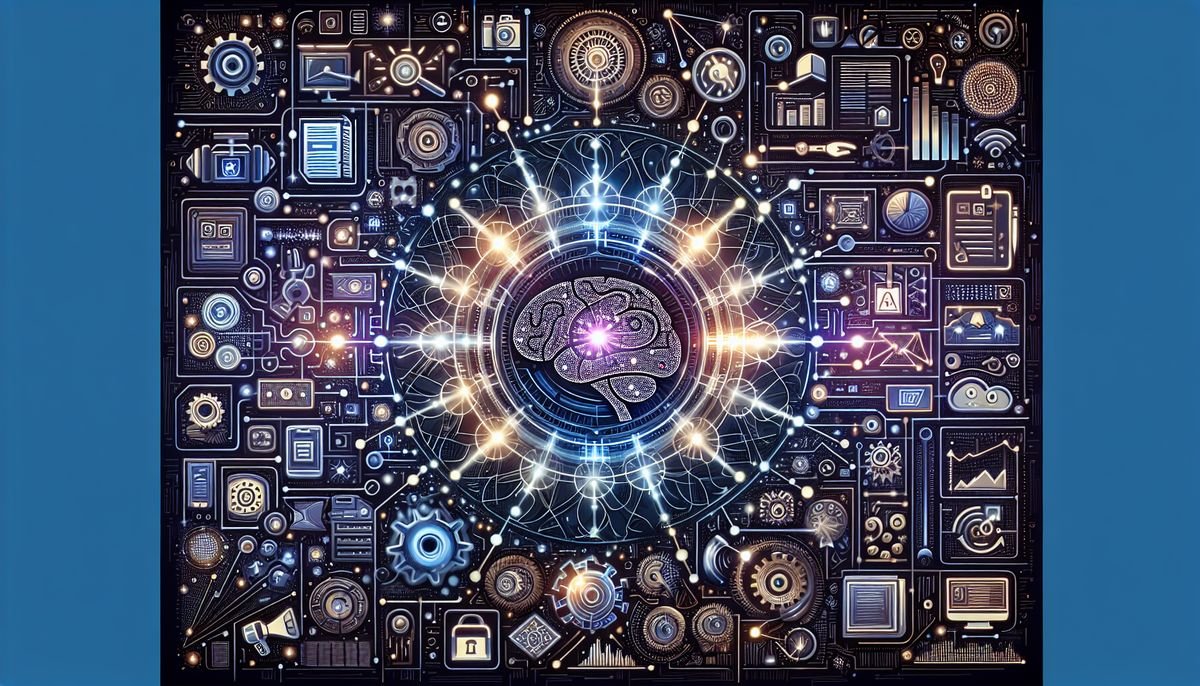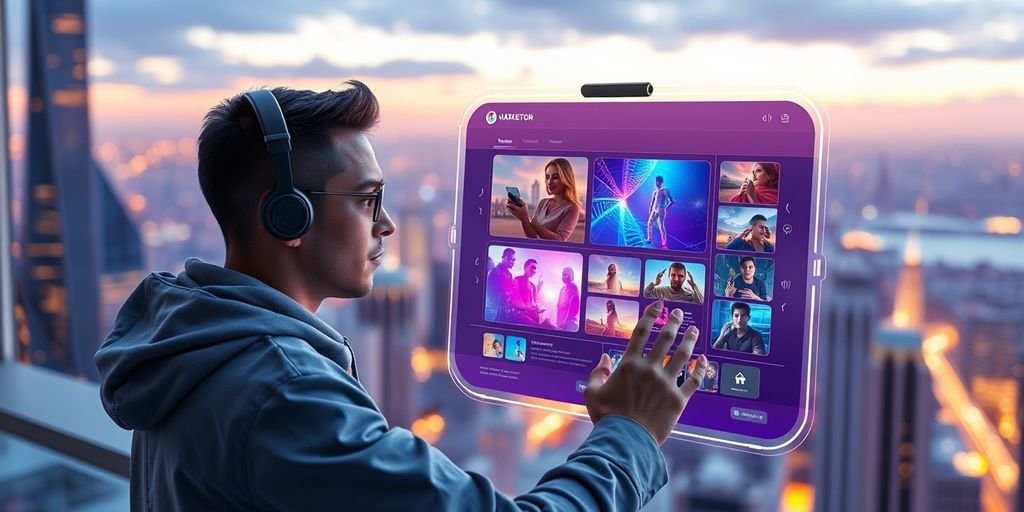In the ever-evolving landscape of artificial intelligence, generative AI stands at the forefront of innovation, redefining the paradigms of content creation. As businesses grapple with the relentless pace of digital transformation, generative AI emerges as a game-changer, offering the ability to autonomously generate text, images, videos, and more. This article delves into the implications of this technology, exploring its transformative effects on industries and society, while providing actionable insights on how to leverage generative AI for competitive advantage.
Key Takeaways
- Generative AI is revolutionizing content creation by enabling the autonomous generation of diverse content types, pushing the boundaries of creativity and efficiency.
- The integration of generative AI can significantly enhance business strategies, from automating news production to providing personalized customer solutions.
- While generative AI offers immense opportunities, it also poses challenges in ensuring information integrity and managing the societal impact of indistinguishable real and artificial content.
The Advent of Generative AI in Content Creation
Understanding Generative AI and Its Capabilities
Generative AI represents a significant leap in the realm of artificial intelligence, particularly in the context of content creation. It harnesses deep learning models and large language models (LLMs) to produce high-quality content across various formats, including text, images, and audio. This technology is not just about automating tasks; it’s about augmenting human creativity and efficiency.
One of the most compelling applications of generative AI is in the realm of automated content generation. Here’s a brief look at how businesses are leveraging this technology:
- Automated Content Generation: Enhancing efficiency and scale by creating articles, reports, and social media posts.
- AI-assisted Design: Augmenting the creative process with tools that can generate logos, layouts, and visual elements.
- Content Enhancement: Using sentiment analysis to refine messaging and tone for targeted audience engagement.
Generative AI is also making strides in data augmentation, where it generates synthetic data to bolster training datasets, thereby improving the accuracy and robustness of AI models.
The recent trend in generative AI tools has seen a surge in their adoption for content creation. Some of the top tools include Synthesia, Bardeen, and Rephrase.ai, each offering unique capabilities to redefine how content is crafted and delivered. As these tools evolve, they promise to unlock new levels of productivity and creativity for businesses.
Revolutionizing Industries with Autonomous Content Generation
The advent of generative AI has marked a significant milestone in the evolution of content creation. Generative AI is changing the world and now is the time to establish your organization as a leader in your industry. This transformative technology is not just a tool for efficiency; it’s a catalyst for innovation, particularly in the creative industry. From AI-generated character models and environments to automated writing and storyboarding assistance, the applications are as diverse as they are groundbreaking.
In the realm of content management, the impact of generative AI is equally profound. The technology’s ability to autonomously produce text, images, and videos is not only enhancing creative production but also improving operational efficiency. Enterprises are now leveraging gen AI to intelligently process documents, summarize reports, extract insights, and automate business communications.
The potential of generative AI to revolutionize a range of industries and services with cutting-edge capabilities is immense. It’s a pivotal moment for businesses to explore and integrate these technologies to stay ahead in a rapidly evolving landscape.
The table below illustrates the diverse applications of generative AI across different sectors:
| Sector | Application | Example |
|---|---|---|
| Marketing | Content generation | AI-written articles |
| Entertainment | Character creation | AI-generated characters |
| Media | Automated reporting | AI-summarized news stories |
| Business | Document processing | AI-extracted insights |
Strategies for Implementing Generative AI in Business
As businesses seek to harness the power of generative AI, strategic alignment with overarching business goals is paramount. Incorporating generative AI into content marketing has emerged as a particularly effective strategy, given its ability to produce high-quality, engaging content at scale. To implement generative AI effectively, businesses should consider the following steps:
- Conduct a Gen AI Maturity Assessment to understand the current capabilities and readiness of the organization.
- Develop a clear roadmap for integrating generative AI, ensuring it complements existing workflows and enhances productivity.
- Focus on internal knowledge management and training programs to maximize the benefits of generative AI.
- Establish strong responsible AI practices and governance frameworks to mitigate risks associated with generative AI.
Embracing generative AI requires a thoughtful approach that balances innovation with responsibility. By doing so, businesses can unlock new levels of efficiency and creativity.
The recent trend towards continuous accounting is a testament to the synergy between generative AI and business processes. By automating time-consuming content workflows, organizations can significantly boost productivity and focus on strategic decision-making. However, it’s crucial to address the key challenges of data and computational requirements, which can be a barrier for many organizations.
The Impact of Generative AI on Business and Society
Automating Realism: The Power of Generative AI in Media
The landscape of media is undergoing a seismic shift with the introduction of advanced Generative AI models capable of producing hyper-realistic content. This leap in technology is not just about efficiency; it’s about the creation of a new realm of media that blurs the lines between reality and artificiality. Generative AI’s ability to automate the creation of realistic images, videos, and texts is transforming the way we consume and trust media.
The potential of Generative AI to revolutionize content creation is immense. Industries such as marketing, entertainment, and media are already exploring the boundaries of creativity and automation. Here are some of the groundbreaking applications:
- Automatic generation of articles and stories
- Creation of artwork and virtual characters
- Development of personalized marketing campaigns
- Production of realistic video sequences for movies and games
The sophistication of Generative AI raises unprecedented challenges in the realms of news, media, and information integrity.
However, this transformation also raises profound questions about the role of humans in creation, challenging the concept of originality and imagination. As we move forward, it is crucial for businesses to navigate these changes responsibly, ensuring that the benefits of Generative AI are harnessed without compromising ethical standards.
The Challenges of Information Integrity in the Age of AI
In recent months, the escalation of generative AI’s role in creating fake news has become a focal point of concern for information integrity. The technological arms race between AI advancements and detection countermeasures is a testament to the ongoing struggle to maintain authenticity in digital content.
Advanced detection algorithms, such as those developed by researchers like Jwa et al. and Bansal et al., are at the forefront of identifying AI-generated misinformation. These tools are crucial in the fight to preserve the integrity of digital information. However, the rapid evolution of generative AI presents a persistent challenge, as each advancement requires a corresponding update in detection methods.
The capacity for creating convincingly realistic fake content poses severe threats to informational integrity and public trust.
The ethical risks associated with generative AI, such as biases, copyright violations, and privacy concerns, necessitate a comprehensive approach to safeguarding content. This includes not only technological solutions but also educational initiatives, ethical guidelines, and collaborative efforts across various domains. Future studies and strategies must address these multifaceted challenges to ensure the continued trust in digital media.
Leveraging Personalized Solutions with Generative AI
In the realm of content creation, Generative AI is paving the way for highly personalized experiences. Businesses are now able to produce unique personalized content that resonates with individual preferences and behaviors. This is not just a futuristic concept; tools like Open AI’s ChatGPT and Microsoft Copilot are already making it a reality. They utilize advanced natural language processing (NLP) to tailor product descriptions, email subject lines, and social media posts, leading to improved engagement and conversions.
Generative AI’s impact is also evident in the education sector, where it facilitates personalized learning experiences. By analyzing student data, it provides adaptive tutoring and intelligent content creation, which are crucial for catering to diverse learning styles and paces.
Here are key ways Generative AI can enhance personalized solutions:
- Adaptive educational materials: Create engaging tutorials and simulations that adapt to individual learning needs.
- Conversational shopping experiences: Utilize dynamic AI agents for human-like interactions in conversational AI systems.
- Tailored marketing campaigns: Analyze customer data to personalize campaigns and product recommendations.
Generative AI stands at the forefront of a revolution in personalization, offering businesses the tools to engage customers on a new level.
As businesses look to leverage Generative AI, they must consider its ability to automate and personalize at scale. This technology not only streamlines operations but also offers a competitive edge in today’s market.
Embracing the Future of Content Creation with Generative AI
In conclusion, generative AI represents a seismic shift in the landscape of content creation, offering businesses an unparalleled opportunity to enhance creativity, efficiency, and personalization. By understanding and leveraging the latest advancements in AI technology, organizations can generate high-quality, relevant content at scale, optimize existing materials, and stay ahead in a competitive market. As we look to the future, it is clear that the integration of generative AI into content strategies is not just an option but a necessity for those aiming to lead in innovation and customer engagement. The transformative power of generative AI is here to stay, and it is imperative for businesses to embrace this technology to unlock new horizons of possibility.
Frequently Asked Questions
What is Generative AI and how is it relevant to content creation?
Generative AI refers to artificial intelligence models that can autonomously generate new content, such as text, images, and videos, after being trained on extensive datasets. Its relevance to content creation lies in its ability to produce high-quality, human-like material, which can revolutionize industries like marketing, entertainment, and media by automating the creation of articles, stories, artwork, and virtual characters.
How can businesses leverage Generative AI for content management?
Businesses can leverage Generative AI for content generation by creating new articles, blog posts, and product descriptions based on specific keywords or topics. Additionally, it can be used for content optimization, where it analyzes and generates suggestions to improve the quality and relevance of existing content. This enables businesses to maintain up-to-date and comprehensive content, saving time and resources.
What are the challenges and implications of Generative AI on information integrity?
Generative AI poses challenges to information integrity as it can create realistic images, videos, and texts that are difficult to distinguish from authentic content. This capability raises concerns about the spread of misinformation and the verification of sources. As such, it’s crucial to develop and implement ethical guidelines and verification methods to ensure the responsible use of Generative AI in content creation.



